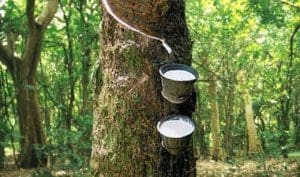Rubber producers in Ghana’s Western Region are urging the state-run Tree Crop Development Authority (TCDA) to impose urgent licensing and oversight on the rubber value chain, warning that unregulated trade practices are crippling livelihoods and driving farmers toward illegal mining.
Yirenkyi Ansah, representing growers in the Nzema enclave, detailed how processors exploit smallholders through suppressed pricing and chronic payment delays. “Many factories rely solely on us for raw rubber but refuse to pay costs-reflective prices. This system destroys livelihoods,” he stated.
Ansah explained that processors operating beyond their plantation capacities depend on smallholder supplies yet fail to provide fair contracts, timely payments, or infrastructure support. The resulting financial strain has forced numerous farmers to abandon rubber cultivation for illegal mining, further depleting the sector’s workforce. “Returns are no longer viable. We’re selling farms to galamsey [illegal mining] operators,” he lamented.
Farmers argue formal regulation would unlock the industry’s potential to drive rural employment and economic growth across rubber-growing regions like the Western, Central, and Ashanti. Licensing processors and traders, they say, could enforce transparent pricing, fair practices, and financing access while attracting investment in local processing. Ghana’s rubber sector—with improved planting materials and value addition—holds billion-dollar export potential but remains stunted by policy gaps and market instability.
“TCDA must intervene now to protect farmers and stimulate rural economies,” the group emphasized, linking regulated rubber expansion to broader goals of industrial growth, cedi stability, and reduced mining-driven environmental damage.
Source: newsghana.com.gh











